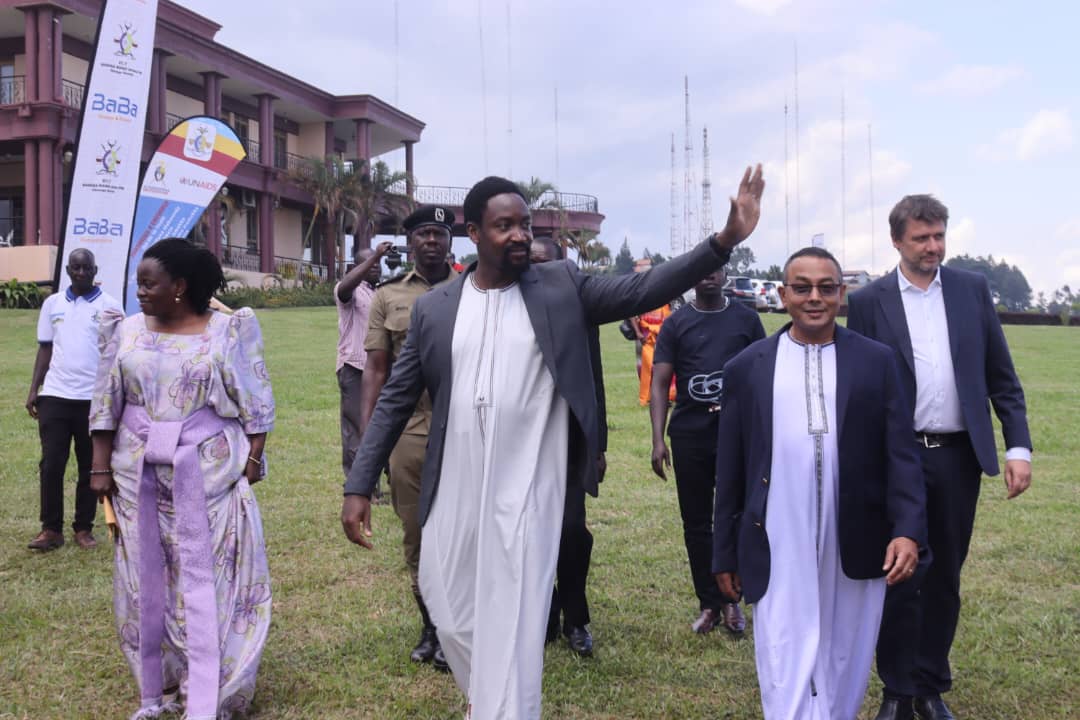Kyabazinga Rallies Stakeholders to Combat Rising Teenage Pregnancies, School Dropouts in Busoga

The Kyabazinga of Busoga, William Wilberforce Gabula Nadiope IV, has convened a high-level meeting with education stakeholders to address the persistent rise in school dropouts and teenage pregnancies in the kingdom.
The meeting, held at Igenge Palace in Bugembe, Jinja City, followed a letter from the Kyabazinga addressed to all concerned parties—including school-going children, headteachers, education officers, and community leaders—urging them to respond to questionnaires that seek to identify the underlying causes of the crisis.
The gathering drew a large crowd, symbolizing the unwavering commitment of the Basoga people in the fight to safeguard the future of their children through education.
The Minister of Education in Busoga Kingdom, Nasab Nantale , commended private education proprietors for their continued support in enabling access to education for those who would otherwise be left behind.
She emphasized the importance of completing the education cycle, saying that it is only through full participation in the system that individuals become relevant to themselves and their communities.
She added that the intervention aims not only to understand the problem but also its root causes and consequences, warning against addressing the wrong issues with ineffective solutions.
Nantale expressed concern that despite significant investment in combating teenage pregnancy, the problem continues to escalate—an indication that the real causes have either not been identified or that the current approach is flawed.
She called for focused efforts to trace children who drop out of school and understand their circumstances.
Moses Mukwaya, head of mobilisation and evaluation under the Kyabazinga's initiative, cited data from the Uganda Bureau of Statistics indicating that the school dropout rate in Busoga currently stands at 28%, with projections suggesting it may rise to 34% if no action is taken.
He highlighted that most girls in the region begin childbearing between the ages of 14 and 19.
With a fertility rate of 4.9%, the number of children affected is expected to grow unless swift interventions are implemented.
Out of the 4.37 million Basoga population, 2 million are children under 18, while the remaining 2.37 million includes youth aged 18 to 35.
He noted that a significant portion of the productive population is underutilized.
He further revealed that only 71% of Basoga are literate, with the majority residing in urban areas like Jinja City, Iganga, and Kamuli.
Additionally, 55.2% of the population depends on subsistence farming, and approximately 840,000 Basoga are considered among the poorest in Uganda. Mukwaya warned that the convergence of these factors significantly raises the risks facing the region.
Dr. Robin Nandy, UNICEF’s representative to Uganda, reiterated the agency’s support in addressing teenage pregnancies and their consequences.
He said UNICEF is working on mechanisms to reduce social stigma and help young mothers return to school.
The organization plans to offer skills training, provide essential resources for the young mothers and their children, and empower them to regain control of their futures.
"These are children having children and its striking we are actually sewing beyond the numbers but we actually see the human element behind that," Nandy said.
Dr. Nandy praised the Kyabazinga’s leadership and vision, especially following his appointment by the United Nations as an ambassador in the fight against teenage pregnancy, and confirmed UNICEF’s readiness to collaborate with the kingdom.
The Katukiro of Busoga, Dr. Joseph Muvawala, thanked the ministers for their service to the kingdom and emphasized the importance of men taking full responsibility for the children they father.
He expressed concern over the erosion of family structures and parental responsibility, pointing out that many children are found in trading centers as early as 6 p.m., a shift from past norms.
He blamed the laxity of parents for increasing children's exposure to dangers, particularly from boda boda riders who are implicated in numerous defilement cases.
" Give birth to only what you can take care of," Muvawala noted.
He urged local governments to pass ordinances restricting children from loitering in trading centers in the evenings and called on schools to prioritize the competitiveness and overall development of learners rather than focusing solely on first grades.
The Kyabazinga reaffirmed the cultural institution’s commitment to lead efforts in restructuring linkages among stakeholders, mobilizing all parties to build a strong and united front to end teenage pregnancy and school dropouts.
He emphasized the need to improve development indicators such as education, health, and household income.
The Kyabazinga urged everyone to uphold their responsibility in shaping the future, calling on teachers to change the mindset of children, especially girls, to remain in school how to overcome life’s challenges.
He pledged to collaborate with government agencies, the private sector, and the broader community to achieve these goals.
"I challenge all of you in your respective roles to pause and ponder on exactly what is going on in our communities and to innovatively come up with strategies to confront these challenges causing an ever increasing rate of school dropouts and teenage pregnancy," Kyabazinga urged.
The Kyabazinga also called on the public to become advocates for education and urged the youth to embrace job creation opportunities in agriculture and the service sector rather than engaging in activities that jeopardize their futures.
He stressed the importance of raising boys and men to become strong pillars of their families, referring to them as abasadha n’empango.



0 Comments